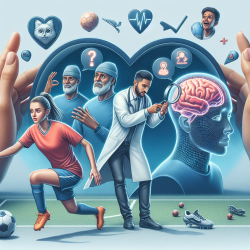Understanding the Unseen: Mental Health Symptoms of Concussions
Concussions are a prevalent concern in the sports community, affecting millions annually. While much attention has been given to the physical and cognitive symptoms of concussions, mental health symptoms often remain under-recognized. This gap in awareness can have significant implications for recovery and long-term outcomes.
The Research Findings
A recent study titled Recognizing the Symptoms of Mental Illness following Concussions in the Sports Community: A Need for Improvement conducted a national survey in Canada to assess the awareness of concussion-related symptoms among youth athletes, parents, coaches, and medical professionals. The study revealed that while physical and cognitive symptoms were identified by over 80% of respondents, only 53.5% could recognize mental health-related symptoms such as anxiety, depression, and irritability.
Why Mental Health Symptoms Matter
Mental health symptoms following a concussion can significantly affect an individual's recovery. Studies have shown that children with mild traumatic brain injuries (TBI) are at a higher risk of developing psychiatric disorders. For instance, a study found that 35.7% of children with mild TBI experienced mood disorders six months post-injury. Recognizing these symptoms early can lead to better management and improved outcomes.
Improving Practitioner Skills
For practitioners working with children in sports, improving skills in recognizing mental health symptoms is crucial. Here are some strategies to consider:
- Education and Training: Engage in continuous education about the latest research on concussion symptoms, particularly mental health aspects. Workshops and seminars can be valuable resources.
- Screening and Assessment: Incorporate mental health screenings into routine concussion assessments. Use validated tools to identify symptoms of anxiety, depression, and other mental health issues.
- Collaboration: Work closely with mental health professionals to provide comprehensive care for athletes. This multidisciplinary approach ensures that all aspects of a concussion are addressed.
- Public Awareness: Advocate for increased awareness of mental health symptoms in the sports community. Educational campaigns can help bridge the knowledge gap and promote early intervention.
Encouraging Further Research
The findings of this study highlight the need for further research into the mental health outcomes of concussions. By understanding the prevalence and impact of these symptoms, we can develop more effective interventions and support systems for affected individuals.
To read the original research paper, please follow this link: Recognizing the Symptoms of Mental Illness following Concussions in the Sports Community: A Need for Improvement.










